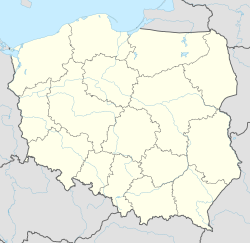| This user subpage is a work in progress article and currently isn't part of Wikipedia. It may or may not be incorporated into an article in the future. It should not necessarily be considered factual nor accurate. Please do not edit this page unless you created it; instead, create your own. |
50°42′N 22°59′E / 50.700°N 22.983°E
Szczebrzeszyn | |
|---|---|
| Coordinates: 50°41′N 22°58′E / 50.683°N 22.967°E | |
| Country | |
| Voivodeship | Lublin |
| County | Zamość |
| Gmina | Szczebrzeszyn |
| Government | |
| • Mayor | Marian Jan Mazur |
| Area | |
• Total | 29.12 km2 (11.24 sq mi) |
| Elevation | 230 m (750 ft) |
| Population (2006) | |
• Total | 5,299 |
| • Density | 180/km2 (470/sq mi) |
| Time zone | UTC+1 (CET) |
| • Summer (DST) | UTC+2 (CEST) |
| Postal code | 22-460 |
| Car plates | LZA |
| Website | http://www.szczebrzeszyn.pl |
Szczebrzeszyn [Polish pronunciation: [sz] Audio file "e" not found] ⓘ (Yiddish: שעברעשין Shebreshin) is a city in southeastern Poland in Lublin Voivodeship, in Zamość County, about 20 km west of Zamość. From 1975–1998, it was part of the Zamość Voivodeship. The town also serves as the seat to Gmina Szczebrzeszyn. It lends its name to the Szczebrzeszyn Landscape Park.
History
editThrough the archaeological record, we know that modern man has lived in the Szczebrzeszyn area for at least 5000 years.[1] The town first appears in written records in 1352, during the reign of Casimir III. However, neighboring villages named in Nestor's 11th century Primary Chronicle suggests that Szczebrzeszyn is much older, once lying beside a major commercial route running from Kiev to Krakow.[2] This is further supported by Jan Olbracht's 1492 special act limiting which roads Szczebrzeszyn merchants could travel on throughout Lesser Poland.
In 1555, King Sigismund II Augustus allocated rights to the city to the Górka family of Greater Poland. In addition to founding a Calvinist church and school, the family actively encouraged Jewish settlement.[3] After a devastating fire destroyed the local castle and important legal documents in 1583, Szczebrzeszyn was granted Magdeburg rights. A decade later, the last of the Górkas died and Jan Zamoyski bought the estates and incorporated them into his Ordynat. Zamoyski continued the tradition of the religious diviserty by building several Franciscan and Catholic establishments in town, including the Cloisters of Saint Katarzyna.[4]
References
edit- ^ Klosinska, E.M. (2007). "Unknown Artefacts from Topornica and Wieprzec, Zamosc Commune, Obtained from Private Collections and from Archaeological Institutions in the Lublin Region". Sprawozdania Archeologiczne. 59: 345–391.
- ^ Nestor (1930). The Russian Primary Chronicle. Trans. Samuel Hazzard Cross. Harvard University Press.
- ^ Dia-pozytyw. "Traces of the Past: Szczebrzeszyn". Retrieved 2008-07-15.
- ^ Klukowski, Zygmunt (1984). "History of Szczebrzeszyn". Shebreshin Yizkor Book.
{{cite book}}: Unknown parameter|coauthors=ignored (|author=suggested) (help)

